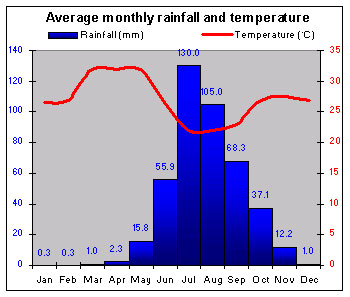COUNTRY INFORMATION |
Introduction |
Guinea lies on the western coast of Africa. Central highlands slope down to coastal plains and swamps; the north is semidesert. Military rule, established in 1984, ended with disputed elections in 1995. Civil wars in neighboring states have spilled over into domestic conflict in Guinea. |
|
Climate |
 |
Guinea's climate is similar to Sierra Leone's. Conakry's six-month rainy season peaks dramatically in July. |
|
People |
| Languages |
Fulani, Malinke, Soussou, French |
|
| URBAN/RURAL POPULATION DIVIDE |
|
|
|
Since the death of Marxist dictator Sekou Touré in 1984, traditional rivalries have reemerged between ethnic groups. The two largest groups are the Fulani, based in the highland region of Fouta Djallon, and the Malinke, who lost the power they had held under Touré, and have suffered reprisals. Today, the coastal peoples, including the Soussou, are dominant, benefiting from renewed rivalry between the Malinke and Fulani. The extended family system survived the climate of suspicion generated by paid informers under Sekou Touré. Women acquired influence within his Marxist party, but a Muslim revival since 1984 has reversed this trend. Hundreds of thousands of refugees, fleeing from conflicts in neighboring countries, are now caught up in fighting in the southern border region. |
|
Economy |
| GNP (US$) |
3303
|
M |
GNP World rank |
128
|
|
| Inflation |
6 |
% |
Unemployment |
No data |
% |
|
StrengthsNatural resources including bauxite, gold, and diamonds. Major iron ore deposits at Mount Nimba. Good soil and climate give high yields. Relatively low inflation. WeaknessesLegacy of maladministration from Touré years. Poor infrastructure. 1990–1997 Liberian civil war set back major joint projects. Current refugee situation a drain on resources. |
|
Politics |
| Lower house |
Last election |
2002 |
Next election |
2007 |
| Upper house |
Last election |
Not applicable |
Next election |
Not applicable |
|
The death in 1984 of Sekou Touré, head of the Marxist single-party regime of the Guinea Democratic Party (PDG) from 1958, opened the way for the military to intervene, with promises of multiparty elections. A 1990 referendum overwhelmingly approved democratic changes, but the military appointed a Transitional Committee, delaying elections until 1993. Incumbent leader Gen. Lansana Conté heavily defeated the Malinke leader, Alpha Condé, who had been in exile until 1992. The opposition claimed the election had been rigged, and serious violence erupted. A disputed victory for Conté's PUP in the 1995 legislative elections was followed by Conté's reelection in 1998. A controversial constitutional referendum in 2001 allowed Conté to stand for a possible third term. The PUP increased its majority in the long-delayed legislative polls in 2002. Fighting escalated into civil war in 2000, with cross-border incursions from rebels based in Sierra Leone and Liberia. |
|
Resources |
| Minerals |
Bauxite, diamonds, gold, iron |
|
| Oil reserves (barrels) |
No data |
Oil production (barrels/day) |
Not an oil producer |
|
Bauxite accounts for over 90% of export earnings. Guinea, with 30% of known world reserves, is the world's largest producer after Australia. Demand for electricity for bauxite processing is high. Gold production has grown steadily since 1995. |
|
Health |
| Life expectancy |
48 |
Life expect. World rank |
167 |
| Population per doctor |
10000 |
Infant mortality (per 1000 births) |
95 |
|
|
|
| Principal causes of death |
Malaria, diarrheal and respiratory diseases, tuberculosis |
|
Health provision is very poor, reflected in Guinea's high infant mortality rate and low average life expectancy. Private health care was legalized in 1984. |
|
Education |
| Literacy |
41 |
% |
Expend. % GNP |
2 |
%
|
|
| PERCENTAGE OF POPULATION IN FULL TIME EDUCATION |
|
| Primary |
59 |
% |
Secondary |
15 |
% |
Tertiary |
1 |
% |
|
French was readopted as the main teaching language in 1984, after Sekou Touré's Marxist-inspired experiments. |
|
Wealth |
| Cars |
2 |
per 1,000 population |
| Telephones |
8 |
per 1,000 population |
| Televisions |
44 |
per 1,000 population |
|
Private enterprise has brought with it a new business class and Guinea now has some wealthy exiles, but much of the country remains poor and underdeveloped; GNP is below $500 per capita.
|
History |
France colonized Guinea in 1890, strongly opposed by the Fulani Muslim empire of Fouta Djallon. - 1958 Full independence under Sekou Touré.
- 1984 Sekou Touré dies. Army coup.
- 1993–1995 Disputed elections.
- 1998 Conté reelected president.
- 2000 Cross-border rebel attacks from Sierra Leone and Liberia place Guinea in a state of civil war.
|
|